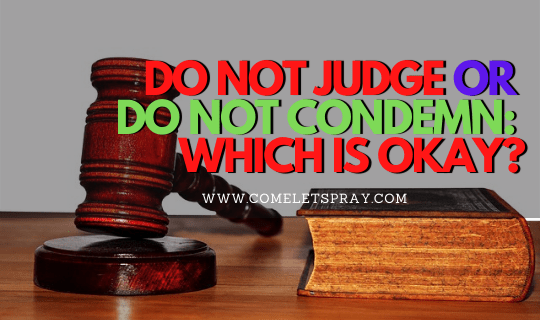The Bible says: “do not judge” is the popular mantra we hear whenever someone calls our attention to some wrong we have done or tries to correct us. And to avoid ‘offending’ others or avoid talking about difficult subjects where we must necessarily take a stand, we sometimes pretend to be ‘liberal’ saying: ‘well, I don’t judge anyone.’ Is this right? If we do not judge each other how do we learn to hold each other accountable with honesty and love? What does the bible actually mean when it says: do not judge or do not condemn? When Jesus told the adulterous woman: I do not condemn you, what does he mean? Is there a difference between judgement and condemnation?
There’s actually a thin line of difference between judgement and condemnation and you need to know this. If you wish to know, continue reading slowly…
5th Sunday of Lent Year C:Isaiah 43:16-21, Psalm 125(126), Philippians 3:8-14, John 8:1-11
John 8:1-11
The scribes and Pharisees brought a woman along who had been caught committing adultery; and making her stand there in full view of everybody, they said to Jesus, ‘Master, this woman was caught in the very act of committing adultery, and Moses has ordered us in the Law to condemn women like this to death by stoning. What have you to say?’ They asked him this as a test, looking for something to use against him. But Jesus bent down and started writing on the ground with his finger. As they persisted with their question, he looked up and said, ‘If there is one of you who has not sinned, let him be the first to throw a stone at her.’ Then he bent down and wrote on the ground again. When they heard this they went away one by one, beginning with the eldest, until Jesus was left alone with the woman, who remained standing there. He looked up and said, ‘Woman, where are they? Has no one condemned you?’ ‘No one, sir’ she replied. ‘Neither do I condemn you,’ said Jesus ‘go away, and do not sin any more.’
POINTS FOR REFLECTION
1. Child of God, to Judge means to form or have an opinion on something. In the juridical sense it means to pass sentence on something or someone. On the other hand, to Condemn means to confer some sort of eternal divine punishment upon someone or something. Judicially, it means pronounce someone guilty of an offence or crime. From these definitions we can situate the actions of the Scribes and Pharisees: after judging the woman’s action to be sinful, they went ahead to condemn her to death quoting the law of moses. Thus showing us that it is one thing to judge or form an opinion about something as good or bad, and another to condemn or confer eternal punishment upon someone.
2. Neither do I condemn You
Jesus does not condemn the woman, but did he judge her? Yes, as scripture says Jesus said to her: “
Go and sin no more.” By this statement Jesus recognises the accusation levelled against her as adultery which is a sin against God. But he didn’t condemn her, like her accusers because as the Christian doctrine teaches us that at death everyone shall receive eternal retribution in a particular Judgement and the souls of those who die in mortal sins (like lust, gluttony, avarice, sloth, anger and pride) will face condemnation or damnation in hell (
CCC 1022-1035). And so whenever we read in scripture, translations saying “do not Judge”, it should be understood as “do not condemn” because we can’t do without making judgements (forming opinion) about things. Infact, not being able to judge ourselves and others reflects lack of spiritual maturity and unaccountability.
3. Condemn the Sin and not the Sinner
Today we learn from Jesus the ability to call things by their names: sin is sin and nothing more! It has become difficult today to label some acts like homosexuality and other forms like
LGBTQ as sinful because we don’t want to offend others or because of personal interests. Both the clergy (ministers) and lay faithful (members) are guilty of this. The church condemns these acts as grave depravity for they are intrinsically disordered but teaches we treat with respect, compassion and sensitivity those with that inclination. Similarly, every sin out there should be condemned but the Sinner should be treated with respect and compassion.
TASK: Pray
Psalm 126 now. Learn to correct the failings of others with respect and gentleness. Don’t be afraid to identify sins by their names and condemn it. It will help you overcome them if you’re guilty.
I Pray for you: May the Lord liberate you from every bondage of sin. That as you sow in tears making sacrifices and prayers to overcome every sin, You will sing when you reap in abundance and become victorious, in Jesus name. AMEN






Amen 🙏